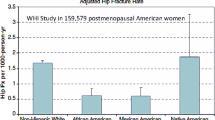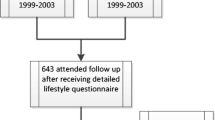Abstract
Summary
In this large population-based study, fracture rates for hips, distal forearms, proximal humeri, and ankles were higher in winter than in other seasons, although the winter peak was small for hip fractures (p < 0.05 at all sites). Younger age between 65 and 80, living in warmer states and male gender were associated with increased winter morbidity due to fractures.
Introduction
The objective was to investigate seasonal variation in the incidence of four common fractures, and explore the association of weather with risk.
Methods
Population-based analysis of individuals age 65 and older, including fractures of the hip, the distal forearm, the proximal humerus and the ankle. Weather information was obtained from the US National Oceanic and Atmospheric Administration website.
Results
For all fractures, rates were highest in winter and lowest in summer (p < 0.05 at all sites). Winter peaks were more pronounced in warm climate states, in men, and in those younger than 80 years old. In winter, total snowfall was associated with a reduced risk of hip fracture (−5% per 20 inches) but an increased risk of non-hip fractures (6–12%; p < 0.05 at all sites). In summer, hip fracture risk tended to be lower during sunny weather (− 3% per 2 weeks of sunny days; p = 0.13), while other fractures were increased (15%–20%; p < 0.05) in sunny weather.
Conclusion
Fractures contribute considerably to winter morbidity in older individuals. Younger age between 65 and 80, living in warmer states and male gender are risk factors for increased winter morbidity due to fractures. Weather affects hip fracture risk differently than the other fractures studied.



Similar content being viewed by others
References
Douglas AS, Allan TM, Rawles JM (1991) Composition of seasonality of disease. Scott Med J 36(3):76–82
Wilkinson P, Pattenden S, Armstrong B et al (2004) Vulnerability to winter mortality in elderly people in Britain: population based study. BMJ 17:17
Wilkinson P, Pattenden S, Armstrong B et al (2004) Vulnerability to winter mortality in elderly people in Britain: population based study. BMJ 329(7467):647, Epub 2004 Aug 17
Lieberman D, Friger MD (1999) Seasonal variation in hospital admissions for community-acquired pneumonia: a 5-year study. J Infect 39(2):134–140
Vilkman S, Keistinen T, Tuuponen T, Kivela SL (1996) Seasonal variation in hospital admissions for chronic obstructive pulmonary disease in Finland. Arctic Med Res 55(4):182–186
Spencer FA, Goldberg RJ, Becker RC, Gore JM (1998) Seasonal distribution of acute myocardial infarction in the second National Registry of Myocardial Infarction. J Am Coll Cardiol 31(6):1226–1233
Jacobsen SJ, Sargent DJ, Atkinson EJ, O’Fallon WM, Melton LJ 3rd (1995) Population-based study of the contribution of weather to hip fracture seasonality. Am J Epidemiol 141(1):79–83
Bulajic-Kopjar M (2000) Seasonal variations in incidence of fractures among elderly people. Inj Prev 6(1):16–19
Hemenway D, Colditz GA (1990) The effect of climate on fractures and deaths due to falls among white women. Accident Anal Prev 22(1):59–65
Jacobsen SJ, Goldberg J, Miles TP, Brody JA, Stiers W, Rimm AA (1991) Seasonal variation in the incidence of hip fracture among white persons aged 65 years and older in the United States, 1984–1987. Am J Epidemiol 133(10):996–1004
Lau EM, Gillespie BG, Valenti L, O’Connell D (1995) The seasonality of hip fracture and its relationship with weather conditions in New South Wales. Aust J Public Health 19(1):76–80
Mannius S, Mellstrom D, Oden A, Rundgren A, Zetterberg C (1987) Incidence of hip fracture in western Sweden 1974–1982. Comparison of rural and urban populations. Acta Orthop Scand 58(1):38–42
Zetterberg C, Andersson GB (1982) Fractures of the proximal end of the femur in Goteborg, Sweden, 1940–1979. Acta Orthop Scand 53(3):419–426
Jacobsen SJ, Sargent DJ, Atkinson EJ, O’Fallon WM, Melton LJ 3rd (1999) Contribution of weather to the seasonality of distal forearm fractures: a population-based study in Rochester, Minnesota. Osteoporos Int 9(3):254–259
Ralis ZA (1981) Epidemic of fractures during period of snow and ice. Br Med J (Clin Res Ed) 282(6264):603–605
O’Neill TW, Marsden D, Adams JE, Silman AJ (1996) Risk factors, falls, and fracture of the distal forearm in Manchester, UK. J Epidemiol Community Health 50(3):288–292
Graafmans WC, Ooms ME, Bezemer PD, Bouter LM, Lips P (1996) Different risk profiles for hip fractures and distal forearm fractures: a prospective study. Osteoporos Int 6(6):427–431
Keegan TH, Kelsey JL, King AC, Quesenberry CP Jr, Sidney S (2004) Characteristics of fallers who fracture at the foot, distal forearm, proximal humerus, pelvis, and shaft of the tibia/fibula compared with fallers who do not fracture. Am J Epidemiol 159(2):192–203
Nevitt MC, Cummings SR (1994) Type of fall and risk of hip and wrist fractures: the study of osteoporotic fractures. J Am Geriatr Soc 42(8):909
Carter SE, Campbell EM, Sanson-Fisher RW, Gillespie WJ (2000) Accidents in older people living at home: a community-based study assessing prevalence, type, location and injuries. Aust N Z J Public Health 24(6):633–636
Campbell AJ, Borrie MJ, Spears GF, Jackson SL, Brown JS, Fitzgerald JL (1990) Circumstances and consequences of falls experienced by a community population 70 years and over during a prospective study. Age Ageing 19(2):136–141
Bastow MD, Rawlings J, Allison SP (1983) Undernutrition, hypothermia, and injury in elderly women with fractured femur: an injury response to altered metabolism? Lancet 1(8317):143–146
Bischoff HA, Stahelin HB, Dick W et al (2003) Effects of vitamin D and calcium supplementation on falls: a randomized controlled trial. J Bone Miner Res 18(2):343–351
Bischoff-Ferrari HA, Orav EJ, Dawson-Hughes B (2006) Effect of cholecalciferol plus calcium on falling in ambulatory older men and women: a 3-year randomized controlled trial. Arch Intern Med 166(4):424–430
Bischoff-Ferrari HA, Dawson-Hughes B, Willett CW et al (2004) Effect of vitamin D on falls: a meta-analysis. JAMA 291(16):1999–2006
Chapuy MC, Arlot ME, Duboeuf F et al (1992) Vitamin D3 and calcium to prevent hip fractures in the elderly women. N Engl J Med 327(23):1637–1642
Trivedi DP, Doll R, Khaw KT (2003) Effect of four monthly oral vitamin D3 (cholecalciferol) supplementation on fractures and mortality in men and women living in the community: randomised double blind controlled trial. BMJ 326(7387):469
Baron JA, Karagas M, Barrett J et al (1996) Basic epidemiology of fractures of the upper and lower limb among Americans over 65 years of age. Epidemiology 7(6):612–618
Karagas MR, Baron JA, Barrett JA, Jacobsen SJ (1996) Patterns of fracture among the United States elderly: geographic and fluoride effects. Ann Epidemiol 6(3):209–216
Fisher ES, Baron JA, Malenka DJ, Barrett J, Bubolz TA (1990) Overcoming potential pitfalls in the use of Medicare data for epidemiologic research. Am J Public Health 80(12):1487–1490
Barrett JA, Baron JA, Karagas MR, Beach ML (1999) Fracture risk in the U.S. Medicare population. J Clin Epidemiol 52(3):243–249
Baron JA, Barrett JA, Karagas MR (1996) The epidemiology of peripheral fractures. Bone 18(3 Suppl):209S–213S
Baron JA, Barrett J, Malenka D et al (1994) Racial differences in fracture risk. Epidemiology 5(1):42–47
Levy AR, Bensimon DR, Mayo NE, Leighton HG (1998) Inclement weather and the risk of hip fracture. Epidemiology 9(2):172–177
Pedrazzoni M, Alfano FS, Malvi C, Ostanello F, Passeri M (1993) Seasonal variation in the incidence of hip fractures in Emilia-Romagna and Parma. Bone 14(Suppl 1):S57–S63
Holmberg S, Thorngren KG (1987) Statistical analysis of femoral neck fractures based on 3053 cases. Clin Orthop 218:32–41
Parker MJ, Martin S (1994) Falls, hip fractures and the weather. Eur J Epidemiol 10(4):441–442
Jacobsen SJ, Goldberg J, Miles TP, Brody JA, Stiers W, Rimm AA (1990) Regional variation in the incidence of hip fracture. US white women aged 65 years and older. JAMA 264(4):500–502
O’Loughlin JL, Robitaille Y, Boivin JF, Suissa S (1993) Incidence of and risk factors for falls and injurious falls among the community-dwelling elderly. Am J Epidemiol 137(3):342–354
Vellas BJ, Wayne SJ, Garry PJ, Baumgartner RN (1998) A two-year longitudinal study of falls in 482 community-dwelling elderly adults. J Gerontol 53A:M264–M274
Holick MF (1985) The photobiology of vitamin D and its consequences for humans. Ann N Y Acad Sci 453:1–13
Harris SS, Dawson-Hughes B (1998) Seasonal changes in plasma 25-hydroxyvitamin D concentrations of young American black and white women. Am J Clin Nutr 67(6):1232–1236
Dawson-Hughes B, Harris SS, Krall EA, Dallal GE (1997) Effect of calcium and vitamin D supplementation on bone density in men and women 65 years of age or older. N Engl J Med 337(10):670–676
Gordon CM, DePeter KC, Feldman HA, Grace E, Emans SJ (2004) Prevalence of vitamin D deficiency among healthy adolescents. Arch Pediatr Adolesc Med 158(6):531–537
Webb AR, Kline L, Holick MF (1988) Influence of season and latitude on the cutaneous synthesis of vitamin D3: exposure to winter sunlight in Boston and Edmonton will not promote vitamin D3 synthesis in human skin. J Clin Endocrinol Metab 67(2):373–378
Standing Committee on the Scientific Evaluation of Dietary Reference Intakes (1997) Dietary reference intakes: calcium, phosphorus, magnesium, vitamin D, and fluoride. National Academy Press, Washington, DC
Ray WA, Griffin MR, Fought RL, Adams ML (1992) Identification of fractures from computerized Medicare files. J Clin Epidemiol 45(7):703–714
Fisher ES, Whaley FS, Krushat WM et al (1992) The accuracy of Medicare’s hospital claims data: progress has been made, but problems remain. Am J Public Health 82(2):243–248
Author information
Authors and Affiliations
Corresponding author
Additional information
Funding
Supported by fellowships from the Harvard Hartford Foundation, from the Swiss Foundation for Nutrition Research, and the International Foundation for the Promotion of Nutrition Research and Nutrition Education.
Rights and permissions
About this article
Cite this article
Bischoff-Ferrari, H.A., Orav, J.E., Barrett, J.A. et al. Effect of seasonality and weather on fracture risk in individuals 65 years and older. Osteoporos Int 18, 1225–1233 (2007). https://doi.org/10.1007/s00198-007-0364-6
Received:
Accepted:
Published:
Issue Date:
DOI: https://doi.org/10.1007/s00198-007-0364-6




